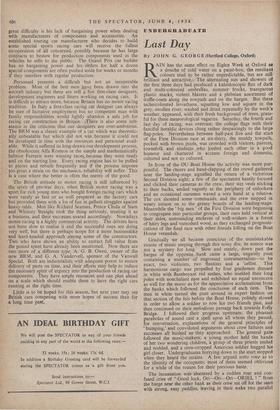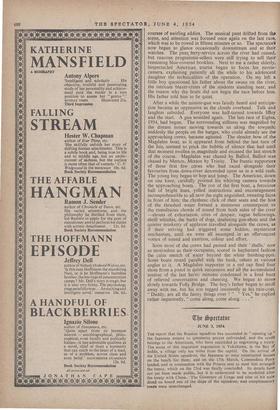UNDERGRADUATE
Last Day
B y JOHN G. GEORGE (Hertford College, Oxford) RAIN has the same effect on Eights Week at Oxford aa a douche of cold water on a paint-box; the resultant colours tend to be rather unpredictable, but are still brilliant and attractive. The alternating sun and showers of the first three days had produced a kaleidoscopic flux of dark and multi-coloured umbrellas, summer frocks, transparent plastic macks, violent blazers and a plebeian assortment of duffle-coats along the towpath and on the barges. But these technicoloured leviathans, squatting low and square in the grey, swollen river, washed and dried repeatedly by the week's weather, appeared, with their fresh background of trees,, grate- ful for these meteorological vagaries. Saturday, the fourth and last day of racing, was overcast; the college flags with their fanciful heraldic devices clung rather despairingly to the large flag-poles. Nevertheless between half-past five and the start of the First Division• race at six-thirty, the muddy towpath, pocked with brown pools, was crowded with visitors, parents, townsfolk and students who jostled each other in a good humour and chattered in accents foreign and domestic, cultured and not so cultured.
In front of the OU Boat House the activity was more pur- poseful. The cheers and hand-clapping of the crowd gathered near the landing-stage signalled the return of a victorious Second Division eight; a few of the spectators hastily focused and clicked their cameras as the crew, their wet vests sticking to their backs, smiled vaguely at the periphery of onlookers and an occasional oarsman waved a sore hand at a relative. The cox shouted some commands, and the crew stepped in weary unison on to the greasy boards of the landing-stage. Meanwhile the ' big men' of the First Division were beginning to congregate into particular groups, their oars held vertical at their sides, surrounding enclaves of well-wishers in a forest of hairy legs and varnished wood, as they exchanged prognosti- cations of the final race with other friends lolling on the Boat House verandah.
Gradually we all became conscious of the unmistakable strains of music seeping through this noisy din; its source was not a mystery for long. Slow and stately, down past the barges of the opposite bank came a large, ungainly punt containing a number of engrossed instrumentalists—to be exact, two violinists, two flautists and a 'cellist. This harmonious cargo was propelled by four gentlemen dressed in white with flamboyant red sashes, who wielded their long poles with nonchalant ease and exhibited an equal unconcern as well for the music as for the appreciative acclamations from the banks which followed the conclusion of each item. The men in white turned the punt around in expert fashion on that section of the Isis before the Boat House, politely slowed in order to allow a soldier to row his two friends past, and then continued on their melodious passage back towards Folly Bridge. I followed their progress upstream; the pleasant parabolas of sound cast a spell upon all whom they passed, for conversation, explanations of the general principles of ' bumping,' and convoluted arguments about crew failures and successes all hushed as they approached. The general gaze followed the music-makers; a young mother held the hands of her two wondering children, a group of three priests smiled and nodded, and a crew-cropped American soldier hugged his girl closer. Undergraduates hurrying down to the start stopped when they heard the strains. A few argued sotto voce as to the identity of the occupants; most of them seemed oblivious for a while of the reason for their previous haste.
The incantation was shattered by a sudden roar and con- fused cries of "Good luck, Ori—Ori—Ori—ORIEL ! " from the barge near the other bank as their crew set off for the start with strong, easy paddles, leaving in their wake two parallel courses of swirling eddies. The musical punt drifted from It scene, and attention was focused once again on the last taco, which was to be rowed in fifteen minutes or so. The spectator) now began to glance occasionally downstream and at their watches. The punk ferry-service across the river had ceased, but raucous programme-sellers were still trying to sell their remaining blue-covered booklets. Next to me a rather elderly, bespectacled American tourist began to focus his movie- camera, explaining patiently all the while to his adolescent daughter the technicalities of the operation. On my left a little boy questioned his father about the swans on the river, the intricate blazer-crests of the students standing near, and the reason why the boats did not begin the race before him. His father told him to be quiet.
After a while the minute-gun was faintly heard and anticipa- tion became as oppressive as the clouds overhead. Talk and laughter subsided. Everyone was half-turned towards Iffley and the start. A gun sounded again. The last race of Eights, 1954, had begun. The surrounding stillness was magnified by the distant noises moving towards us along the towpath; suddenly the people on the barges, who could already see the approaching crews, became agitated. The slender bow of the Magdalen boat, as it appeared from behind the last turn of the Isis, seemed to prick the bubble of silence that had until that moment swollen in magnitude and encased the last stretch of the course. Magdalen was chased by Balliol, Balliol .was chased by Merton, Merton by Trinity. The frantic supporters of these first few crews who had raced alongside their favourites from. down-river descended upon us in a wild rush. The young boy began to hop and jump. The American, down on one knee, carefully pointed his whirring camera towards the approaching boats. The cox of the first boat, a ferocious ball of bright hues, yelled instructions and encouragement incomprehensible to all save the eight anguished, sweating faces in front of him; the rhythmic click of their seats and the hiss of the thrashed water formed a strenuous counterpoint to the tumultuous chords of sound from both sides of the river —shouts of exhortation, cries of despair, vague bellowings, shrill whistles, the barks of dogs, deafening gun-shots and the quieter musketry of applause travelled alongside the crews, as if their striving had triggered some hidden, mysterious mechanism, until we were all swamped in an effervescent vortex of sound and exertion, colour and effort.
Soon most of the crews had passed and their ' shells,' now as motionless as their occupants, scored in haphazard fashion the calm stretch of water beyond the white finishing-post. Some boats rested parallel with the bank, others at various angles to it. A Magdalen supporter in a red cap fired four shots from a pistol in quick succession and all the accumulated tension of the last hectic minutes condensed in a loud buzz of relieved conversation and cheering. We began to move slowly towards Folly Bridge. The boy's father began to stroll away with me, but his son tugged insistently at his rain-coat. " Daddy, are all the funny things over ? " Yes," he replied rather impatiently, " come along, come along. . . . "



































 Previous page
Previous page